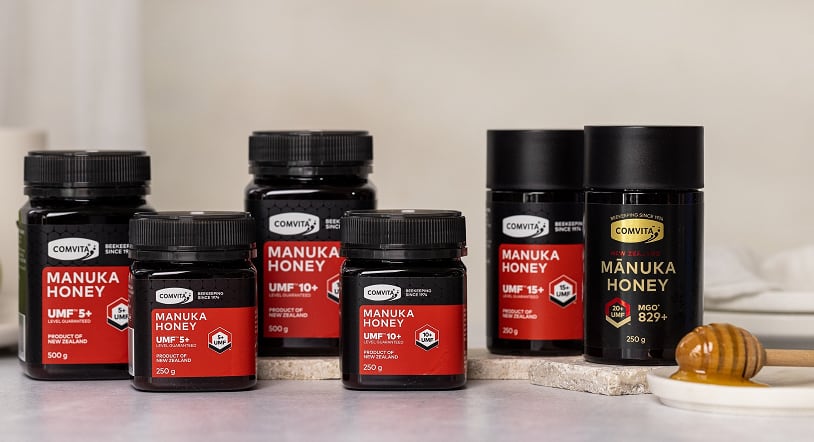Florenz Limited, owner of New Zealand mānuka honey brand Wedderspoon distributed in North America, is looking to acquire Comvita for $0.80 cents per share.
This represents an equity value of approximately $56 million and an enterprise value of approximately $119 million.
In a statement to NZX yesterday (August 18), Comvita’s board said it unanimously recommended shareholders vote in favour of the acquisition scheme.
Its two largest shareholders, China Resources Enterprise and Li Wang, who together own approximately 18.3% of Comvita shares, are also said to be supportive of the transaction and have entered into voting commitments in agreeing to vote all their shares in favour of the acquisition.
Comvita’s shareholders will cast their vote at a meeting expected to take place in November. If successful, the acquisition scheme is expected to be implemented in December.
Also a New Zealand company, Florenz was founded only last year and is headquartered in Christchurch.
Comvita, on the other hand, was founded in 1974 and had a recent change in CEO, with Karl Gradon taking over the helm from acting CEO Brett Hewlett.
Comvita: Florenz brings capital strength and scale
The privatization could accelerate a capital return to shareholders while giving Comvita capital strength to continue its business amid market headwinds in recent years, according to Comvita board Chair Bridget Coates.
Comvita has been facing headwinds from oversupply, demand and price volatility, intense competition, and softer market conditions in recent years, following a period of strong performance during COVID-19.
“Comvita has faced ongoing pressure from structural changes in the mānuka honey sector, which continues to face oversupply, price and demand volatility, and intense competition (including online).
“The environment is fragmented, with several participants under financial strain. Industry dynamics require consolidation at pace, but sector leadership demands capital strength, scale and speed, which are not available to Comvita under its current capital structure,” said Coates in a statement filed to NZX.
In FY24, Comvita’s annual revenue was down 12.7% to NZD$204.3m (US$127.8m), while net profit plummeted 142.6% to a loss of NZD$5.6m (US$3.5m). The company will announce its financial results for FY25 next Friday (August 29).
According to last year’s results, Comvita’s biggest market was China, but the market’s appetite for premium mānuka honey has been seeing a decline.
Factors include general macroeconomic slowdown and price wars from competitors cheap “entry range” mānuka honey products. A 250g UMF 5+ mānuka honey, for instance, could be bought at 29.99 yuan (US$4.23) on China’s JD.com. Comvita itself has also launched “value range” of its products in China on the back of prevailing market trends.
While the company has sought various means to address the challenges, including investing in brand equity, distribution, and scientific credibility, some of the challenges remained or intensified, prompting the company to seek other solutions.
“Trading conditions in FY25 have remained challenging and, consistent with previous guidance, Comvita expects to report a significant loss for FY25 as well as a material write-down of the net assets as a result of impairment testing and provision against inventories.
“Comvita’s lenders are providing short-term accommodation but have signalled that a longer-term solution - through debt repayment or potential strategic transactions - is required.
“Against that backdrop, the Board – alongside its independent advisors, Craigs Investment Partners and Goldman Sachs – has acted with urgency to consider all strategic options available, including potential acquisitions by financial sponsors and strategic trade buyers, subordinated debt issuance and an equity capital raise.
“None would deliver the same transaction certainty, and several carried significant dilution or execution risk,” Coates said.
In comparison, an acquisition by Florenz could provide capital strength and scale and drive Comvita’s growth under a consolidated model.
“They have expressed their commitment to Comvita’s global team, growing its New Zealand operations, investing in its international markets and lifting the brand’s profile on the world stage.
“They value the expertise within Comvita, its role as a flagship New Zealand brand and are proud to have the opportunity to keep this iconic company under New Zealand ownership,” said Coates.
In addition, the acquisition scheme could speed up capital return to shareholders and provide shareholders with a full exit opportunity in a stock with historically low trading volumes, she said.
Florenz CEO: To grow in North America, Asia
Florenz, on the other hand, said that the acquisition could help drive Comvita’s presence in the North American market as well as helping its other brands grow in Asia by tapping on Comvita’s existing distribution footprint.
“While Comvita has been experiencing many challenges in recent years, it remains the biggest mānuka honey products business globally.
”A key attraction of the business to Florenz is its world-class science and NPD capability," Florenz’ global group CEO Mike Tod said in a LinkedIn post on August 18.
In the North America, for instance, Comvita could tap on Wedderspoon’s mānuka honey distribution network - and vice versa.
Comvita’s distribution network in Asia could help Florenz’s other natural health and wellness brands to expand their geographical footprint. These brands include 2before Performance Nutrition, Harker Herbals, and Xtendlife Group Limited.
“This bid is an important milestone for Florenz as it seeks to deliver on its ambition of becoming New Zealand’s leading exporter of natural health and wellness products, while also safeguarding and growing some of our country’s most iconic natural brands,” Tod added.





